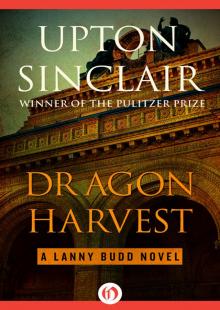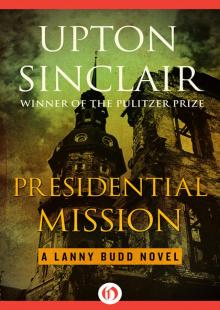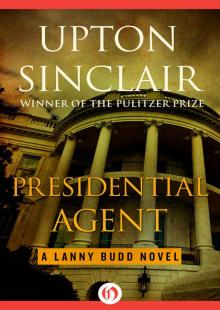- Home
- Upton Sinclair
World's End (The Lanny Budd Novels) Page 15
World's End (The Lanny Budd Novels) Read online
Page 15
He saw an extraordinary spectacle—the owner of the yacht, having apparently recovered his health, had taken from the wall a red-painted fire ax, and with it was vigorously chopping at the lock of one of the cabin doors. “Open up!” he would shout; then, without waiting for anyone to obey, he would give another mighty whack. A steward in white duck jacket, and a deckhand, also in white, stood staring with wide eyes; the first mate came running, and then Lanny, Marcel, Lanny’s mother, Lord Eversham-Watson, the baroness—all crowding into the corridor and standing speechless.
Two or three more whacks and the door gave way, and the owner of the Bluebird stood gazing inside. The others couldn’t see—they kept away from the ax, whose wielder was panting heavily. For a few moments this hard breathing was the only sound; then he commanded: “Come on out!” No answer from within the cabin, and he shouted more fiercely: “Come out; or do you want me to drag you?”
From inside came the voice of Captain Fitz-Laing: “Put the ax down.”
“Oh, I’m not going to hit you,” replied Ezra. “I just wanted to see you. Come on out, you dirty skunk.”
Fitzy came limping through the doorway, his handsome face very pale, his clothing in disarray. He passed the large and powerful soapman, watching him guardedly. The others made way for him, and he went down the corridor.
“You saw him, now take a look at her,” said the man with the ax. He was speaking, not to his guests, but to the members of the crew; several others had come, and the owner of the yacht ordered them to the doorway, insisting: “You have seen her? I shall need you for witnesses.” Thus directed, they peered into the cabin, from which came now the sounds of Edna Hackabury’s weeping.
“You know her?” demanded Ezra, relentlessly. He set his ax against the wall, and took from his pocket a pencil and some paper. “I want your names and addresses, some place where I can reach you,” he said. From one man after another he got this information and wrote it down carefully, while the sobbing inside the cabin went on, and the guests stood, helpless with embarrassment, not saying a word.
“Now then,” said Ezra, when he had what he needed, “I’m through.” He turned to the group of guests. “I’ll leave you this floating whorehouse,” he declared. “Take it any place you please. I’m going back to God’s country, where people still have a sense of decency.”
There came a scream from the cabin, and Edna rushed out, half undressed as she was, and flung herself at her husband. “No, Ezra, no!” She started to plead that she hadn’t meant it—she had been too much tempted—she would never do it again—he must forgive her. But he said: “I don’t know you,” and pushed her away and went on down the corridor.
The first person he had to pass was Lanny, and he stopped and put his hand on the lad’s head. “I’m sorry you had to see this, son,” he remarked, kindly. “You’re in a tough spot. I hope you get out of it some day.” He walked by the others without looking at them, and went into the cabin he had been sharing with Lanny and started throwing his belongings into a couple of suitcases. His wife followed him, weeping hysterically. She groveled at his feet, she begged and besought him; but each time he shoved her out of the way. When he had what he needed in the suitcases, he took one in each hand and strode out of the cabin and up the companionway, crossed the gangway to the shore, stepped into one of the waiting hacks—and that was the last they saw of him.
VIII
Doubtless things like that have happened in the Isles of Greece on many occasions, both ancient and modern; but none of these people had ever seen it, and they found it more exciting than looking at ruins or buying picture post cards of the Parthenon. The ladies gathered in poor Edna’s cabin, and did what they could to console her, telling her that she had got rid of a great burden, and ought to be thankful. Ceddie Fashynge and Eddie Patterson went out and found Captain Andrew Fontenoy Fitz-Laing bracing himself with a few drinks in a café, and brought him back to the Bluebird.
When they had time to think matters over, they realized that it wasn’t so bad; they had got rid of a dreadful bore, who in a crisis had shown himself a ruffian as well. Edna and Fitzy would no longer have to hide and cower. The latter, being a gentleman, would of course offer to marry her; but unfortunately he had nothing but his army pay, and couldn’t keep a wife on that. Perhaps the soapman would make a settlement; anyhow, if he stuck by his word and left her the yacht, it would make a tidy nest egg.
The question was, what should they do next? They had been having such a jolly time, and it would be a shame to end it. Fortunately there was a person on board who could afford to keep the cruise going, and that was Eversham-Watson—or rather, his wife. Prompted by her, he said he would see them back to Cowes, which they had chosen as the place for the ending of their cruise. “The honor of England is at stake,” said his lordship; his bright and chirrupy little American wife had told him that, and he said it—solemnly and heavily, so that it sounded like a political speech instead of a joke.
Everybody wanted to get away from the Piraeus, before the madman from Indiana changed his mind and came back and turned them out. Edna gave the order to put to sea and she moved into Fitzy’s cabin—it was necessary, really, since the door of her own was split to pieces and the carpenter had to make a new one. There were now three pairs of happy lovers on the yacht, to say nothing of one married couple who had learned to get along reasonably well. There was no longer anything to be concealed, and nobody to embarrass anybody else.
Lanny had a cabin to himself now, and if he missed his elderly friend, he did not tell anyone. He was left to speculate by himself about the strange scene he had witnessed; for nobody on board seemed to want to talk to him about it. Despite his having acquired a complete supply of the facts of life, his mother was greatly embarrassed, and considered that Mr. Hackabury had committed an outrage in allowing a child to witness such a scandal. All Beauty said was that the soap manufacturer had shown himself a crude and boorish person; “one of those men who think they can buy a woman’s heart and hold it like a chattel.”
All the party seemed to sympathize with Edna, except Marcel Detaze. From remarks he made to Beauty, Lanny gathered that he had his own ideas; but he didn’t explain them to Lanny, and the boy was shrewd enough to realize that he must never under any circumstances come between Marcel and his mother, and had better not even know if there was any difference between them.
The Bluebird steamed south to Crete and then to the coast of Africa. The weather was hot, the sea blue and still, no one seasick, and no cloud in anyone’s sky. They had hundreds of records for the phonograph, and played American ragtime and danced under the awnings which covered the after part of the deck. When they came to Tunis, and the ruins of what had been Carthage, they were in the midst of a long siege of poker; but the yacht stopped to get fresh fruits and vegetables, so Marcel and Lanny went ashore, and saw strange dark men wearing white hoods, and women going about completely veiled, with eyes black as sloes peering out seductively. They saw another sunset over broken shafts of marble, and Marcel told about Hannibal who had driven the elephants across the Alps, and Cato who had said every day all his life that Carthage must be destroyed. Lanny hadn’t known that ancient history was so interesting, and went looking for a bookstore in Tunis, something hard to find.
Then Algiers, and they all went ashore and paid strange musicians and dancers to entertain them. They hired camels and rode into the interior, and saw date-palms growing, and poked into native houses, and Marcel sat for hours making sketches which he would use by and by. Lanny stuck to him, asking questions and learning about lines and shadows. The boy had now decided that he liked painting best of all the arts; for dancing was being ruined, nobody cared for anything but hugging each other and moving around in a slow kind of stupefied stagger.
But painting was something you could do by yourself. Lanny dreamed of some day achieving what Marcel had given up in despair—to convey, on canvas, that sense of melancholy which came over them, watching a sunset be
hind the ruins of old civilizations, and thinking about the men who had lived in those days and tried to make the world more beautiful. You wanted to call to those men to come back. You couldn’t bear to know that they would never hear you; that they were gone, and all their dreams, their music and dancing, their temples and the gods who had dwelt in them! Some day you also would be gone, and other men would stand and call to you, and you, too, would not hear.
8
This Realm, This England
I
The harbor of Cowes lies on the sheltered side of the Isle of Wight, and is the headquarters of the Royal Yacht Squadron and scene of the great regatta every summer. Here came the Bluebird at the beginning of May, in time for the pleasant weather and the opening of the London “season.”
The gay company broke up. Edna Hackabury received a communication from a firm of solicitors representing her husband, and went up to the city to learn her fate. Beauty Budd was going to visit the Eversham-Watsons at their town house. Marcel Detaze was returning to his studio on the Cap d’Antibes, to put upon canvas his memories of Africa and Greece. The plan had been for Lanny to return with him; but here was a letter from Eric Vivian Pomeroy-Nielson, to whom Lanny had written from Athens. Rick begged: “Oh, please don’t go away without seeing me! I’ll come to town to meet you, and we’ll go to the opera and the Russian ballet. Pretty soon school will be over, and you can come to the country with me. Kurt Meissner is coming, and we’ll have a grand time.”
Kurt wrote from his school. He had worked hard and won prizes, and his father had promised him a reward. He had an uncle who was an official in a rubber company and had business in London, and was willing to take him along, to see the Russian ballet, and to hear the symphony orchestra and the opera, and to learn all he could about English music. So of course Lanny began begging to stay, and Lady Eversham-Watson said: “Why not? The dear little fellow can enjoy himself at our country place as long as he pleases, and if he wants to come to town, there will be someone to bring him.”
If you have ever drunk Kentucky Bourbon, you have probably contributed to the fortune of Margy Petries; if you have ever read a magazine in the English language, you have surely not escaped the self-praises of “Petries’ Peerless.” Lord Eversham-Watson had met the creator of this beverage at one of the racing meets, and had been invited to come to the bluegrass country and see how they raised horses. He had come, and seen, and conquered, or so he had thought; but that was because he didn’t know Kentucky girls. Margy was one of those talkative little women who make you think they are shallow, but underneath have a sleepless determination to have their own way. His lordship—“Bumbles” to his friends—was heavy and slow, and liked to be comfortable; Margy was his second wife, and all he demanded was that she shouldn’t go too far with other men. She had paid his debts, and he let her spend the rest of her father’s money for whatever she fancied.
As a result, here was an old English country house that you could really live in. All the rooms had been rearranged and everybody had a bathtub. The old furniture, dingy, smelling of the Wars of the Roses—so Margy said, though she had the vaguest idea what or when they were—had been sold as antiques, and everything was now bright chintz or satin, with color schemes that said, gather ye rosebuds while ye may. There were light wicker chairs and tables, and twin beds for fashionable young wives. Old tapestries in the billiard room had been replaced with a weird device called “batik,” and there was a bar in the smoking room, patronized mainly by the ladies, and having decorations out of a children’s nursery tale. The rugs were woven in futurist patterns, and on them lay two Russian wolfhounds with snow-white silky hair; when these noble creatures went out in wet weather they donned waterproof garments of a soft gray color edged with scarlet and fastened with two leather straps in front and another about the middle.
If you were a guest at Southcourt you could have anything there was in the Empire; all you had to do was to indicate your wish to one of the silent servants. This silence was to Lanny the most curious aspect of life in England; for in Provence the servants talked to you whenever they felt like it, and laughed and joked; but here they never spoke unless it was part of a ritual, such as to ask whether you wanted China or Ceylon tea, and white or Demerara sugar. If you spoke an unnecessary word to them, they would answer so briefly that you felt you were being rebuked for a breach of form. They wanted you to assume that they did not exist; and if one of them forgot something, or did it wrong, the usually placid “Bumbles” would storm at the unfortunate creature in a manner that shocked Lanny Budd far more than it did the creature.
You weren’t supposed to notice this, and if you didn’t, you would find Southcourt a delightful place to stay. There were plenty of horses, and generally somebody wanting to ride. There was a comfortable library, and Margy had not bothered to change the books. The pleasantest part of life at an English country house was the way you were let alone to do what you pleased. The rule of silence applied only to house servants; the gardener would talk to you about flowers, and the kennelman about dogs, and the stableman about horses. The place was in Sussex, and there were rolling hills, now fresh with spring grass; Lanny had thought of England as a small island, but there seemed to be great tracts of land that nobody wanted to use except for sheep. The shepherds, too, didn’t mind talking—the only trouble was they used so many strange words.
II
Somebody was motoring to town, and Lanny went along. Automobiles were becoming faster and more dependable every year, also more luxurious. It had suddenly occurred to many persons at once that they didn’t need to ride in the open, with a gale blowing on them, and ladies’ hats having to be tied on with many yards of chiffon. No, they were now enclosing cars like little rooms. The one Lanny rode in was called a “sporting saloon,” and consisted of a square black box in the rear, with a long black cylinder in front for the engine; it was heavy and the tires were small, but Lanny had never seen anything so elegant, and it was marvelous to come rolling into London in your own private parlor. The chauffeur sat out in the wind, and wore goggles, and his cap was fastened to them, and a high tight collar made him sit up straight and stiff. He drove on the left side of the road, and Lanny couldn’t get over the idea that somebody would forget about that and run into them.
Rick came to town to spend Saturday and Sunday, and they fell into each other’s arms. He was English, but being a devotee of the arts, he didn’t mind letting a friend know that he was glad to see him. Rick was such a handsome fellow, with dark eyes and hair very wavy; he had a slender figure, elegant manners, and fastidious tastes—Lanny was quite overwhelmed by him, and proud to introduce him to his friends.
And what a lot they had to talk about! Lanny had been to Silesia, and to Greece and Africa, while Rick had been coming in week-ends to theaters and operas. They were both at the growing age, and measured each other, and tried each other’s muscles, and danced a bit, and played odds and ends of music, and chatted about the Russian ballet which was to open next week, and they would make a date for the Saturday matinees and get their tickets right away.
This was at the town house of the Eversham-Watsons, where Beauty was staying, and also Edna Hackabury. The latter had been to see her husband’s solicitors, and had been informed that he had filed suit for divorce in Indiana. If Mrs. Hackabury contested the action, she would undoubtedly lose and get nothing; if she agreed not to contest, Mr. Hackabury would give her the choice of the following: the yacht, to be placed in escrow and to become her property on the day the decree was final; or an income of ten thousand dollars a year for life.
Edna had been making inquiries, and learned that yachts were a standard commodity, bringing good prices, so she was all for proposition number one. But her military gentleman announced that his rights as a future husband were not going to be put in escrow. He said if Edna got the price of the yacht she would spend it on clothes and parties in a year; whereas Bluebird Soap stood close to British consols in the estimation of
“the City,” and two thousand pounds a year was a sum on which a retired army officer and his spouse could live comfortably in some not too fashionable part of the Riviera. So it was settled; and Edna’s friends agreed that she was fairly lucky. She had her clothes for the present season, and would be “top-notch” for that long. She must put on a bold front and not let anything get her down.
There was gossip, of course; you couldn’t keep such a story from the journalists, who flutter like hummingbirds over the social flower beds, sticking their long noses into everything. There were paragraphs of the sort known as “spicy”: a yacht that was in the social as well as the marine register, and an owner in the role of infuriated husband chopping down a cabin door with an ax intended for a different sort of fire. No names were given, but “everybody” knew who it was, and ladies whispered and put up their lorgnettes when the soapman’s wife and her slightly lame captain came strolling across the greensward at Ranelagh. Edna wore a genuine Paquin creation—it was a “Paquin year,” and the famed woman dressmaker had set off the American’s soft white skin and raven-black hair with a striking ensemble of the same bold contrasts. Picture a dashing wide black hat with three saucy corners, and with aigrettes sticking in several directions like broom-tails; a black riding jacket and white blouse with rolling collar and tie like a man’s; a huge muff of black fur with tails nearly to the ankles; a tall white cane like a shepherd’s crook; and on a leash the world’s wonder, one of those priceless Japanese Chin dogs famed for their resemblance to a chrysanthemum—a black “butterfly” head with a white blaze over the skull, and long white hair almost to the ground, and a tail curved exactly like the petals of a great flower. That was “swank” of the season of 1914; it was vif, it was chic, it was la grande tenue.

 Prince Hagen
Prince Hagen Dragon Harvest
Dragon Harvest The Jungle
The Jungle Sylvia's Marriage
Sylvia's Marriage Oil! A Novel by Upton Sinclair
Oil! A Novel by Upton Sinclair The Coal War: A Novel
The Coal War: A Novel Presidential Agent
Presidential Agent World's End
World's End The Second-Story Man
The Second-Story Man O Shepherd, Speak!
O Shepherd, Speak! Wide Is the Gate
Wide Is the Gate The Return of Lanny Budd
The Return of Lanny Budd One Clear Call I
One Clear Call I 100%: the Story of a Patriot
100%: the Story of a Patriot The Machine
The Machine Presidential Mission
Presidential Mission A Cadet's Honor: Mark Mallory's Heroism
A Cadet's Honor: Mark Mallory's Heroism Between Two Worlds
Between Two Worlds World's End (The Lanny Budd Novels)
World's End (The Lanny Budd Novels) Between Two Worlds (The Lanny Budd Novels)
Between Two Worlds (The Lanny Budd Novels) The Coal War
The Coal War Presidential Agent (The Lanny Budd Novels)
Presidential Agent (The Lanny Budd Novels) Oil (filmed as There Will Be Blood)
Oil (filmed as There Will Be Blood) Wide Is the Gate (The Lanny Budd Novels)
Wide Is the Gate (The Lanny Budd Novels)